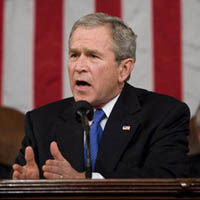Paradoxes doom Bush’s new strategy in Iraq
President George W. Bush’s paradoxical “new strategy” in Iraq is doomed by its own contradictions as much as by Iraqi and regional paradoxes and would in no time prove that the U.S. president’s go-it-alone approach will only extend the failure of the 2003 military invasion in developing into a permanent occupation, amid wide spread world and American calls for withdrawal and political solution.

“The new strategy I outline tonight will change America's course in Iraq,” Bush said in a speech on January 10; on scrutiny however the “change” he promised boils down essentially to upholding the same course but trying to change the tactics; on deeper scrutiny even the “new” tactics are unmasked as the same old ones.
His speech was more a noisy acknowledgement of failure in Iraq than a robust declaration of a new strategy for success: Four years on, he was still unable to declare that “we could accomplish our mission with fewer American troops” in Iraq; “the opposite happened. The violence … overwhelmed the political gains;” “Their strategy worked,” he announced, referring to “Al Qaeda terrorists and Sunni insurgents;” there are now “death squads” and “a vicious cycle of sectarian violence.” “The situation in Iraq is unacceptable to the American people -- and it is unacceptable to me,” he concluded, and took the responsibility for the “mistakes (that) have been made.”
However Bush stopped short of honestly admitting his failure, though the “message came through loud and clear;” according to him the “failure” is not yet the reality of the day in Iraq, but only a possible threat that “would be a disaster for the United States” and should be averted. Hence his “new strategy” to avert the imminent “disaster;” and this was his first paradox because he could not correctly diagnose the U.S. predicament in Iraq and consequently he could not prescribe the right course.
“The most urgent priority for success in Iraq is security,” Bush said; accordingly he resorted to more military force. Of course the “success” he meant was that of the U.S. invasion and not the success of any political process that would save the Iraqis from their disastrous and tragic status quo created by the invasion itself. Here lies his second paradox: The four-year military failure has been brought about by the failed “political process” his administration sponsored in Baghdad’s Green Zone, which houses the Iraqi government and the huge U.S. embassy, and by the absence of a credible Iraqi national reconciliation political process.
The latest U.S.-air covered “Iraqi” 3-day military attack on the civilian Haifa Street, which controls the bridges linking eastern to western Baghdad, one kilometer away from the Green Zone, was a humiliating symbol of the failure of both the U.S. military strategy and the U.S.-sponsored political process. How could this resounding failure be rectified by the meager increase in U.S. troops by 21,000, which Bush announced, to accomplish a mission that 140,000 could not accomplish over four years?
The prerequisite for any credible Iraqi national reconciliation process is the withdrawal of the occupying forces, or at least setting a definite timetable for their withdrawal, something that Bush was keen to completely ignore in his “new strategy” speech, which was his third paradox.
The Iraqi resistance - which surprisingly was active on the ground on the first days of the U.S. occupation and all throughout ever since undermined his strategy - is the integral backbone of any credible Iraqi national reconciliation political process; Bush has not only ruled it out of his political process for the past four years but singled it out as the main target of his new military campaign, thus sliding his county into the 4th paradox of his “new strategy.”
His 5th paradox is more like shooting oneself in the legs. According to Bush, the sectarian violence is the source of insecurityin Iraq.His speech however had no mention whatsoever of either the U.S. or Iranian-sponsored militias, the major culprits in the death squads, ethnic and sectarian cleansing, assassinations, kidnappings, random killings and other sever human rights violations, all which created a hell of an insecurity environment across Iraq, but mainly in Baghdad.
Adding insult to injury Bush, in his 6th paradox, wanted the Iraqis to sweep his waste: “Only Iraqis can end” the sectarian violence, he said, absolving himself of the responsibility for the sectarianism that mushroomed with the rumbling and roaring of his invading tanks and war planes to shake the very fabric of the Iraqi society and break into the peace of their daily life.
Destroying the Iraqi state could not but drive people to seek security and services in tribal or sectarian brotherly protection, or to look for them under the protection of armed gangs. In the absence of the state, destroying a secular ruling ideology creates the empty space that could only be filled by sectarian, ethnic, tribal and gangster players. Bush did exactly that; his country should be held accountable as long as her forces remain in Iraq; only when these forces leave can “only Iraqis” sweep away their waste.
Bush also set the end of the sectarian violence as the main target of his new strategy, but hinged its success on “the Iraqi government” and offered it as a plan that compliments “their campaign to put down sectarian violence,” thus indulging himself in his 7th and 8th paradoxes. On the one hand he entrusts a sectarian government that is part of the problem to quell the sectarian violence depending on an army, police and security agencies that are structured on shares for the political sect leaders whom Bush brought in as successors to late Saddam Hussein and the Baath Party. On the other hand he and his Secretary of State, Condoleezza Rice, undermined the credibility they tried to bestow on Prime Minister Noori al-Maliki and his government by warning them publicly to deliver on their “promises,” otherwise “America's commitment is not open-ended.” Rice has stated on several occasions that al-Maliki is “living on borrowed time,” unless it delivers.
It was only normal that Bush had resorted to warnings to mobilize Iraqi support for his doomed strategy as a prelude and a pre-emptive measure to lay the responsibility for the expected failure of the “new strategy” at their doorsteps.
The 9th component of his self-contradictory strategy is leading more than 300,000 U.S.-trained Iraqi troops and police and more than 150,000 American troops and Marines to focus on besieging Iraqi cities, towns and villages and breaking into Iraqi homes and neighborhoods instead of directing them to defend the Iraqi borders against what he condemns as the infiltration of “foreign fighters” from the neighboring countries, especially from Syria and Iran.
This leads to his 10th paradox. If more than 450,000 U.S. and Iraqi troops are engaged in domestic missions is it not logical to engage the neighbors, especially Iran and Syria, at least to secure the sections of the common border with Iraq until the time those troops are ready to deploy and defend their borders themselves?
Closely linked to this is Bush’s 11th paradox. A success or a face-saving exit from Iraq after four years of proven failure requires at least a bipartisan consensus internally in the United States, but Bush seems determined to go it alone, contrary to the recommendations of the James Baker-Lee Hamilton bipartisan panel, the advice of his top generals and the wishes of the majority of U.S. voters according to the Washington Post - ABC News poll conducted immediately after Bush’s January 10 speech.
Similarly world as well as regional support is detrimental for the success of any U.S. plan in Iraq, let alone a plan to turn failure into a success or to face-save Washington withan exit outlet, but Bush’s new strategy in its 12th paradox seems to have alienated potential support both internationally and regionally: Only Australia’s Prime Minister John Howard offered unqualified support and the al-Maliki government in Baghdad.
The closest U.S. allies and friends were not forthcoming: Britain was ambiguous and said she remained on track to withdraw its forces from Iraq, not increase them. On Thursday, Angela Merkel, the German chancellor, declined to discuss Iraq with reporters. The French and Spanish views had publicly favored “broad political strategy” and “only political solutions,” according to their respective foreign ministers, as their Dutch counterpart concluded that Bush’s new plan “hasn’t changed anything.” Italy’s Prime Minister criticized Bush: “He should listen to the Baker report and to the American public.” Japan’s Asahi Shimbun warned of his “dangerous gamble.” The Israeli security expert Chuck Freilich warned of a zero-sum game that could “splinter” Iraq, “radicalize” the region and turn Iran into “the regional hegemon.” Moscow saw that Washington’s “calculation remains the same: To achieve a settlement of the Iraq crisis by force,” according to the Russian Foreign Ministry. France’s Le Monde published a cartoon depicting Bush as a bulldozer driver shoveling American soldiers into a ditch in the shape of Iraq.
Regionally Bush’s 13th paradox is provokingly seeking the support of Sunni Arab governments in his new military campaign against their co-religious brothers in Iraq and mobilizing their anti-Iran efforts while at the same time his new strategy will only strengthen Tehran’s hands in Baghdad. “As a key component of the Iraqi social fabric, the Iraqi Sunni community must be included as partners in building Iraq's future,” and not targeted, Jordan’s King Abdullah II told Rice on Sunday, a view voiced also by Egypt and the Saudi Foreign Minister Saud al-Faisal, as a representative view of the 6-member GCC countries: A change in U.S. policy toward Iraq was inevitable, “Unity of Iraq is necessary, independence of Iraq is necessary and peace in Iraq is necessary,” he said, adding: “None of these have been achieved so far. There must be a change, of course.”
Rice’s latest regional tour was building on Bush’s warning to moderate Arab states that the U.S. failure in Iraq threatens “to topple moderate governments, create chaos in the region;” Bush held the stick but sent Rice with an illusionary carrot: She tried to give the impression that Washington could strike a deal with them to trade their support in Iraq and against Iran for their hope to revive the deadlocked peace process with Israel. However very few in the region believe the Bush Administration could deliver now on what it failed to deliver during the past six years, with less than two remaining years in office.
Bush’s Paradoxical “New Strategy” blinded him to see that the threats he warned against in his speech are already in the works in Iraq and threatening to spill over the borders: The “radical extremists” are growing and not “would grow” in strength and gaining new recruits; they are and not “would be in a better position” to create chaos in the region; Iran is and not “would be emboldened;” U.S. enemies have already and not “would have a safe haven” in Iraq and America that “must succeed” there has failed.
It would be a miracle if “the Iraqi government” could “take responsibility for security in all of Iraq's provinces by November,” a date that Bush suggested to Americans as the date for success or for a U.S. exit, although he was careful to redress by stating that “there is no magic formula for success in Iraq.”
By Nicola Nasser
Nicola Nasser is a veteran Arab journalist based in Ramallah, West Bank of the Israeli-occupied Palestinian territories.
Speak your mind on Pravda.ru English forum! Say what you want
Subscribe to Pravda.Ru Telegram channel, Facebook, RSS!





